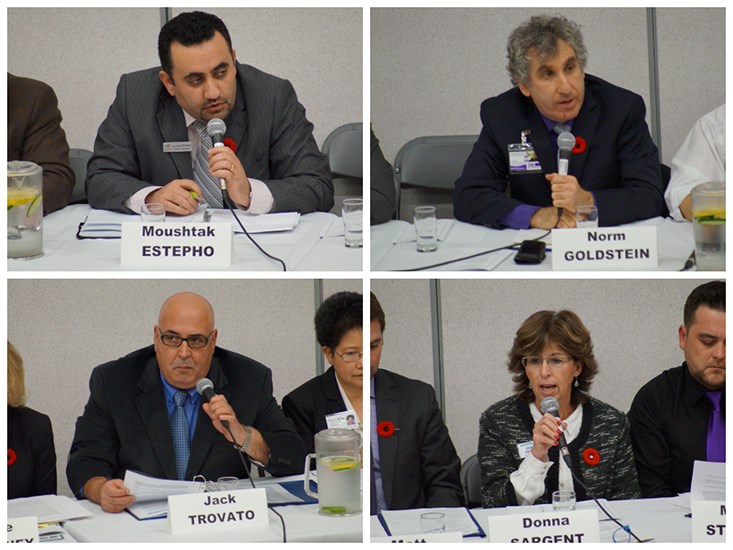Eighteen school trustee candidates gathered Wednesday night at Richmond secondary school for the only all-candidates meeting for the Richmond Board of Education, ahead of a Nov. 15 vote that will introduce four-year terms.
Few issues stood out more than the need to advocate for more provincial government funding in public schools.
In fact, the issue ate up most of the meeting, as candidates acknowledged their limits; district funds come from the province and are then subsequently dispersed to programs, which are decided upon by trustees.
The issue permeated into most of the questions.
Richmond Citizens’ Association trustee candidate Jack Trovato separated himself from all other candidates on corporate funding for schools.
“We need to restore funding, not offer bake sales,” said Trovato, who was one of the last candidates to answer how one would raise money to fund an underfunded education system.
Trovato, a teacher and member of the BC NDP, said advocacy is needed above all. All the other candidates said as much, as well. However, all, except Trovato, were open to looking to more community agreements and corporate sponsorships that could save the district money or raise funds for programs.
Matt Pitcairn of the Richmond Community Coalition, and member of the BC Liberal Party, called underfunding an “unfortunate reality.” He said his business experience working with all levels of government would lend itself to developing “strong, firm, transparent policies in place” on corporate funding.
Candidates were asked to respond, “yes” or “no,” if they would support a program, such as Chevron’s Fuel Your Schools in Richmond.
Candidates Kenneth Ho (Richmond Reform), Ken Hamaguchi, Michael Cober and Norm Goldstein (RITE Richmond) said they would agree to such a program. Pitcairn, Alice S. Wong (Renew Richmond), and Richmond First trustees Donna Sargent (board chair) and Eric Yung couldn’t give a one-word answer.
Michael Starchuk, of RITE Richmond, said “no” to the Chevron question, but when asked how he would raise money for schools he said he would be open to corporate sponsors if it were done in an “ethical” manner, but didn’t explain what that would look like.
Hamaguchi also said the issue is a “slippery slope” that should be managed.
Sargent said there are already some instances of third-party partnerships in Richmond, but she also noted they must be done carefully. She also said growing the international student program is another option, which, again, must be done carefully.
Her trustee colleague and running mate Debbie Tablotney said as much.
“We need to do it carefully because if we rely on it, it can be a problem,” she said.
Kenneth Ho also supported more international students.
Richmond now earns about $13 million per year, or roughly seven per cent of its overall budget from international students.
Kenneth Ho also said he would propose online courses.
Candidates were asked to answer “yes” or “no” if they “would support an LGBTQ policy in Richmond.”
Kenneth Ho and Jonathan Ho, of the Richmond Community Coalition, said “no.”
Wong, Yung, Tablotney, and Pitcairn could not give a straight answer. Nor did Richmond First candidates Kevin Lainchbury and Peter Liu and Moushtak Estepho, of the RCC.
That left RITE Richmond, including trustee Rod Belleza, as the only slate to unconditionally support such a policy.
Sandra Nixon is the only candidate to have raised the issue before the meeting.
Sargent initially said the question was “unfair,” later clarifying that the district already has a code of conduct that includes “all children.” She told the Richmond News no one has come to the board expressing a gap in adequate rights protection. But if the issue were raised, she would support a more specific policy, such as those that exist in several other school districts in Metro Vancouver.
Candidates also discussed the possibilities of pre-screening for kindergarten students to address individual needs.
Belleza said he would support such a program.
Hamaguchi, among others, supported it, but noted such a thing needs money.
“As soon as you identify the problems, the sooner you can get after them…but we better identify the resources and services needed,” said Hamaguchi.
Estepho said the issue needed great consultation, noting each child has different development stages, which could be problematic.
Lainchbury voiced concerns that screening sounds “very clinical,” but noted early intervention is key and assessment is needed on a continued basis.
Liu disagreed with screening at that age.
Sargent said, “kids don’t show all their needs before age five” and “streaming kids into certain programs is just not right.”
Also, she said, to introduce a new program “with the funding we have we’d be making cuts (elsewhere).”
Trovato said he was primarily concerned with funding, as children are already waiting years for psychological assessments, which can cost thousands of dollars.
Yung said such a program would need to have an opt-out clause for parents who disagreed with it and results must be kept private.
Voters will choose seven trustees on Nov. 15. Trustees Kenny Chiu and Grace Tsang left the board for other political endeavors.



